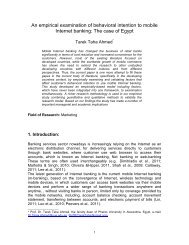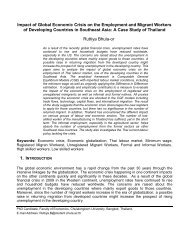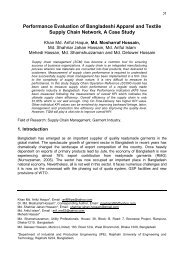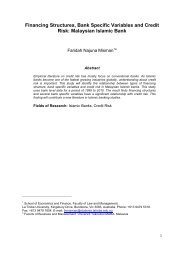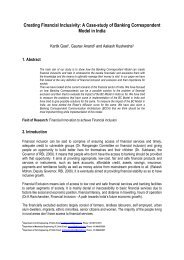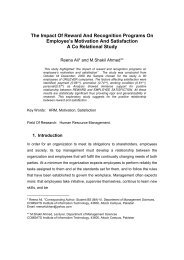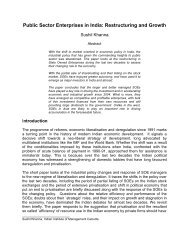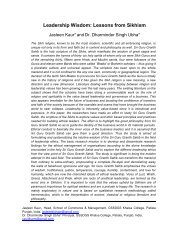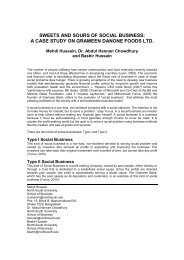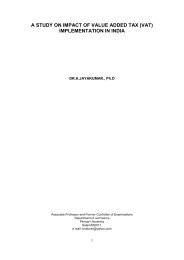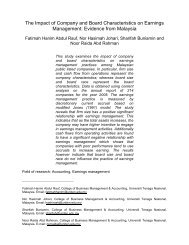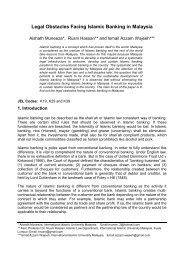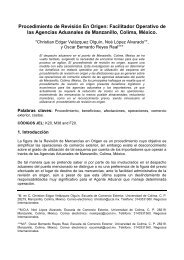Human resource management (HRM) has emerged as a key ...
Human resource management (HRM) has emerged as a key ...
Human resource management (HRM) has emerged as a key ...
- No tags were found...
Create successful ePaper yourself
Turn your PDF publications into a flip-book with our unique Google optimized e-Paper software.
eviewing 66 studies conducted in different countries, concluded that trainingleads to improved knowledge, skills, abilities, attitudes, and behavior ofemployees that ultimately enhance excellent financial and non-financialperformance of the organizations. Moreover, Mexican companies consideremployee training and development <strong>as</strong> their sources of competitive advantagesto face the challenges of globalization (Ruiz & Germain, 2008). In addition,training activities have noteworthy influence on employees‟ organizationalcommitment in manufacturing firms in India (Agarwala, 2008). Distinctive <strong>HRM</strong>practices have enabled Japan in becoming one of the most industriallydeveloped countries of the world through creating competitive advantages(Hoque, 1990; Mohiuddin & Mahmood, 1999). Besides, <strong>HRM</strong> practices of Chinahave contributed a lot in turning the country into an economic power of the worldwithin five decades (Warner, 2001).Then, employee compensation, especiallythe performance b<strong>as</strong>ed compensation system, resulted in better organizationalperformance in Indian firms (Singh, 2004). In Chinese firms, <strong>HRM</strong> practices werefound to have significant influence on employee affective commitment (Yu & Egri,2005). Hence, it is evident from the above discussion that the role of human<strong>resource</strong> <strong>management</strong> practices towards improving organizational performancein every part of the world, from developing countries to developed countries, istime-tested. Now the world is more competitive than ever. Due to emergence ofglobal village, this competition <strong>h<strong>as</strong></strong> become more severe. To survive in the era offierce competition, industrial enterprises need to create sustainable competitiveadvantage b<strong>as</strong>ed on human <strong>resource</strong> <strong>management</strong> practices (Barney, 1991;Khandekar & Sharma, 2005). In today‟s world, the central challenge that acountry faces is the continuous improvement of the performance of itsorganizations, both of public and private sectors (Khan, 2007; Werther & Davis,1996). Due to flow of globalization, trade liberalization, unparalleled recession,and technological breakthroughs; industrial enterprises of Bangladesh are undertremendous pressure to improve productivity, quality, innovation, and overalleffectiveness.Historically, Bangladesh is an agro-b<strong>as</strong>ed country. More than 50% of itspopulation is employed in agriculture (GOB, Ministry of Finance, 2007). However,the contribution of agriculture to the GDP <strong>h<strong>as</strong></strong> shown declining trends in recentyears (GOB, Bangladesh Bureau of Statistics, 2007). As possibility of growth inagriculture of Bangladesh is constrained by a number of social, economic, andphysical re<strong>as</strong>ons such <strong>as</strong> small land-man ratio, natural calamities, and rapidurbanization; the need for the development of industrial sector <strong>h<strong>as</strong></strong> been obvious(Aowrangazab, 2005). Low growth in agriculture <strong>h<strong>as</strong></strong> created tremendouspressure on industrial sector through the influx of surplus laborers fromagriculture to industry. The unemployment problem of Bangladesh, one of thepopulous nations of the world, will be further deteriorated until and unlessindustrialization through labor intensive manufacturing enterprises is accelerated.In 1971, Bangladesh started its journey <strong>as</strong> an independent and sovereign nation.During that time only 4% GDP came from industrial sector, most of which were3



